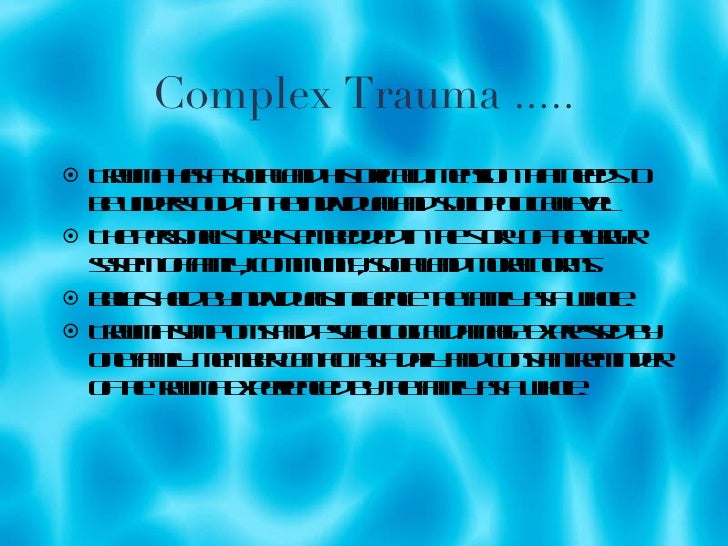


Memory processing can be accomplished through traditional talk therapy, as well as newer techniques like eye movement desensitization and reprocessing (EMDR). You’re working through grief from unwanted or abusive experiences and also grieving positive experiences you missed out on. This stage moves into dealing with difficult memories and the emotions and reactions they stir up.

It’s vital not to begin engaging traumatic memories until stage two. It’s important here to begin identifying destructive patterns of behavior and learning to respond differently.
Complex trauma how to#
You’re learning how to regulate emotions and preparing mentally for recovery, including preparing to reencounter of damaging memories. This is where you get an overview of the recovery process, making sure you’re in a safe and stable place physically and relationally. Her steps for overcoming trauma are shared in Psychology in the Real World’s writing collection and summarized here: Harvard psychiatrist Judith Herman developed the C-PTSD diagnosis, as well as a model of the three phases of recovery from complex or severe trauma. Complex trauma (or C-PTSD) can lead to substance abuse, self-harm, avoidance, and the inability to accept criticism. In contrast, reports that PTSD symptoms include reliving trauma, avoiding triggering situations, changes in beliefs and feelings, hyperarousal (feeling constantly on edge), and somatic symptoms of various kinds (like unexplained pain or ear ringing). Trouble with relationships, including self-isolating and difficulty trusting others.Detachment, including bouts with memory loss or dissociation.Difficulty managing emotional responses (anger, depression, and suicidal thoughts).What Are the Symptoms of Complex Trauma?Īccording to, complex trauma symptoms include: Some may even get hit with a double-dose of abuse (as discussed here), both in the home, and again at school via bullying, leaving a survivor doubly traumatized. And this may cause “fundamental changes to brain development, neurochemistry, psychological stress response, and associated alterations in identity, behavior, and relationships” as they try to endure the abuse. Such trauma may come in the form of emotional, physical, and/or sexual abuse, and may be perpetrated by a caretaker. It encompasses exposure to “ multiple, often interrelated forms of traumatic experience and the difficulties that arise as a result of adapting to or surviving these experiences,” according to .Ĭomplex trauma is a term used for repeated, chronic emotional pain or abuse, often suffered in childhood or adolescence. Though not yet in the official psychiatric diagnostic manual, complex trauma is now a widely accepted diagnosis. But there are options for complex trauma treatment that can help those struggling, and even feeling hopeless about it, to find healing. It can cause long-term problems that are similar in some ways, but distinct in others, from post-traumatic stress disorder (PTSD), and also from “regular” trauma. We look forward to meeting you and working together.Complex trauma is a term used for repeated, chronic emotional pain or abuse, often suffered in childhood or adolescence. What is most important to us is that you feel listened to and understood, so you are empowered to make decisions about your treatment. We will provide you with a range of options to access support in improving areas of your life that are important to you, or working out what is important to you. Your therapeutic plan might also include practical help. help you find out more about who you are.enable you to have more fulfilling relationships.This might include a specific therapy, or psychologically-informed intervention. We will then be able to recommend options for your treatment. Together we will formulate a tailor made therapeutic plan for the next stages of your treatment. At the end of these sessions we will share with you how we see your experiences. The early phase will take up to six sessions. We will always treat you with kindness and compassion and as an equal partner in your care. This helps us gain a greater understanding of the difficulties you may have experienced in your life and how they impact on your life now. However, we would like to hear this from you. We will have talked to the professionals who referred you, so already have some understanding of your problems.


 0 kommentar(er)
0 kommentar(er)
